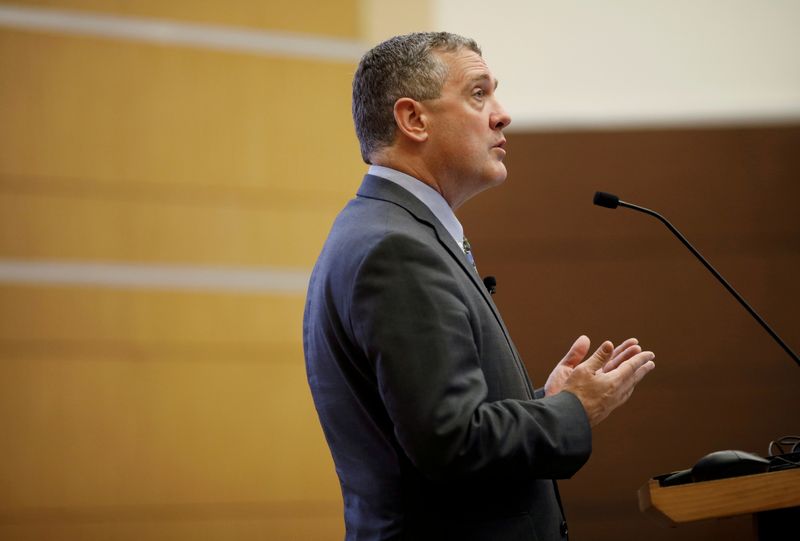By Howard Schneider
WASHINGTON (Reuters) - The coronavirus pandemic may have pushed the United States into a volatile era of stronger growth and better productivity, but higher interest rates and faster inflation as well, St. Louis Federal Reserve president James Bullard said, elaborating on why he thinks the U.S. central bank should end its crisis-era policies.
Bullard, who five years ago said he viewed the United States as mired in an epoch of low growth, low productivity and low inflation, said he is beginning to think a new "regime" may have arrived where the Fed will have to cope with faster change and more frequent shocks.
For more than a decade before the pandemic "economic growth was slow and not very volatile and inflation in tandem was slow and not very volatile," Bullard said in an interview with Reuters on Monday. "This environment is a very different one where you have upset the global equilibrium...The reverberations will continue, and you will have a lot more volatility than you are used to."
On the plus side that could mean a run of productivity- enhancing developments that keep U.S. growth and wages rising fast; the risk is higher inflation that could upend the Fed's current expectation that price pressures will ease on their own and allow for continued loose monetary policy.
"We will have long, lingering effects as the rest of the world recovers. You have shortages and bottlenecks everywhere. You have Europe likely to grow more quickly in coming quarters," Bullard said. "You have industries still adjusting to the post-pandemic world - many things happening, and at a pace we are not used to."
In that setting "monetary policy needs to be more nimble."
CHANGING IN FUNDAMENTAL WAYS
His comments come with a specific policy recommendation: that the Fed begin trimming its $120 billion in monthly asset purchases soon, cut them to zero by early next year, and be ready to raise interest rates if inflation does threaten to remain too high for too long. After missing its 2% target during a decade of weak inflation, the Fed wanted to encourage a period of faster price increases, but now may be at risk of getting too much of what it asked.
But his views speak to a deeper prospect: That the economy may have changed in fundamental ways over the past 18 months, leaving the Fed looking at a different landscape than when it established a new framework just about one year ago.
That framework envisions giving more weight to job growth, and allowing inflation to run above 2% for a time to let employment expand.
With the economy growing faster and inflation running higher than expected, outside analysts have noted that the approach involves navigating tricky terrain - allowing unemployment to dip below what's considered a sustainable rate before it rises back to its "natural" level.
"Cooling an overheated labor market has rarely ended without recession," JPMorgan (NYSE:JPM) economist Michael Feroli wrote in mid-July, concluding that while the Fed's new framework wasn't destined to fail, it did in his view increase the likelihood of a "hard landing" when the central bank does have to raise interest rates. The policy rate is currently near zero, and Fed officials at the median don't see it changing until some time in 2023.
Bullard said his call for faster action on ending bond purchases is to lower that likelihood, making smaller, earlier steps rather than risking the need to "scramble" later on.
It's possible the United States and world economies may not have changed all that much. While a productivity model Bullard watches does show improvement, it did so also after the end of the last recession before fading.
Yet current inflation is well over the Fed's target, and at levels which prior Fed chairs like Alan Greenspan "would have...immediately tried to quash," Bullard said. "We are not being that preemptive. Our models say this will settle down, but in the meantime it will be pretty volatile...What I want to be prepared for and get the committee prepared for is the risk that this is an unpredictable situation.”
